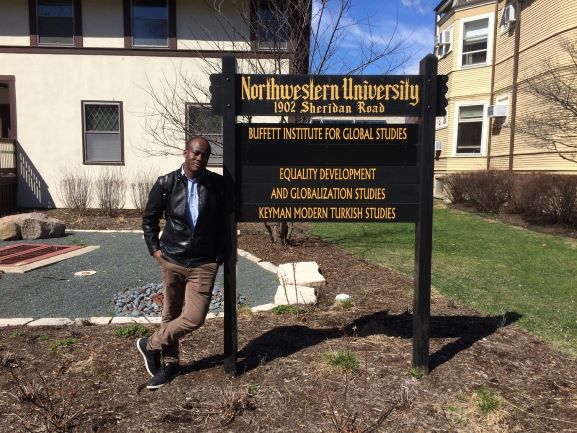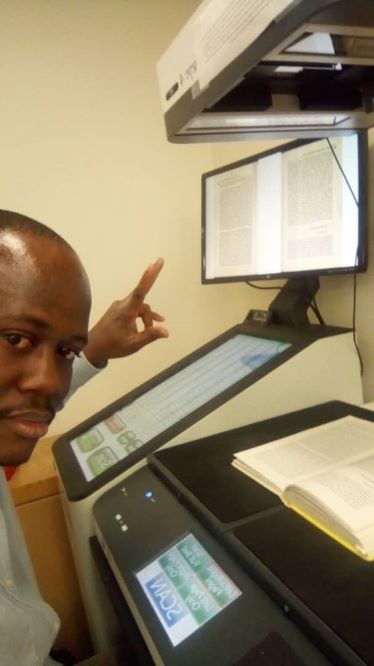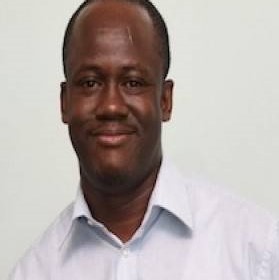Voices from the Sylff Community
Frank Afari, a 2017 Sylff fellow from the Graduate Institute of International and Development Studies, visited Northwestern University in the United States to conduct archival research at the Melville J. Herskovits Library of African Studies, which holds the largest Africana collection in the world. Using an SRA award, his project centered on Transitional Justice, defined as a field of activity and inquiry focused on how societies address legacies of past human rights violations through the use of truth commissions and other mechanisms. His focus was on Ghana’s National Reconciliation Commission, a truth commission set up in 2002.
* * *
Since independence in 1957, Ghana has had a reputation for being a relatively peaceful and stable country. While the country has not experienced any civil war or violence on the scale that has wrecked other countries in the West African sub-region, there are still isolated pockets of simmering conflicts in parts of Ghana. Most conflicts in Ghana revolve around chieftaincy disputes[1], ethnicity[2], and power struggles between and within political parties. Though isolated, these conflicts have often resulted in loss of property and lives. In the northern part of Ghana today, most of the conflicts pertaining to chieftaincy and ethnicity have long historical roots and were complicated under British colonial rule. In theory and practice, the British colonial policy of indirect rule compelled strong powerful chiefs who wielded centralized authority to rule over noncentralized acephalous states, a move that facilitated the imperial bureaucracy of ruling through powerful indigenous political structures. Consequently, hitherto independent societies and polities lost political autonomy and control over their land and resources. This system of subjugating acephalous or stateless societies under powerful centralized states perpetuated a legacy of contentious subject-overlord relations. Unfortunately, the postcolonial state did not redress these colonial anomalies.
In 1992, Ghana transitioned from a military dictatorship to constitutional rule, ending a spate of military truncations of democratically elected civilian governments, and this birthed the Fourth Republic. The Fourth Republic ushered in a culture of smooth transfer of power through the ballot box. An outgrowth of the country’s growing democratic culture since then has been its capacity to deal with internal conflicts through institutional means. One such institution is the National Peace Council (NPC), a statutory body created to effectively resolve conflicts and build peace in Ghana. The NPC was established in 2006 by the Government of Ghana under the aegis of the African Union, with operational support from the United Nations Development Program (UNDP).
A decade ago, while I was pursuing my graduate studies in Ghana, I interned as a part-time research assistant with the NPC. I understudied the working staff during its numerous field trips to conflict-ridden communities and major flashpoints in northern Ghanaian towns such as Bawku. Bawku is plagued by regular outbreaks of inter-ethnic and chieftaincy-related violence. During my several field trips to Bawku, I encountered victims of horrendous atrocities. These conflicts, whose effects I witnessed firsthand, got me interested in the history of politically motivated and state-sponsored violence, human rights violations, extra-judicial killings, and illegal confiscation of property. I later discovered that I could use the findings of another statutory body, the National Reconciliation Commission (NRC), a truth commission established in 2002 to investigate past human rights violations and foster reconciliation in Ghana, as a window into the history of state-sponsored political violence in postcolonial Ghana. Until the establishment of the NRC, so much of Ghana’s turbulent past had been obscured by its recent democratic successes. When I was admitted into the PhD (International History) program at the Graduate Institute in Geneva in 2016, I chose to investigate as a doctoral project the historical undercurrents of the NRC’s reconciliation exercise under the rubric of transitional justice and human rights.

At the entrance of my host center, the Buffett Institute for Global Studies, Northwestern University.
On October 27, 2018, I traveled from Geneva, Switzerland, to Northwestern University (NU) in the United States to conduct seven months of archival research at the Melville J. Herskovits Library of African Studies, which holds the largest Africana collection in the world, and also to conduct interviews with experts for my ongoing doctoral thesis. I sought to explore what the archives contain about governance in Ghana over the longue durée since its independence in 1957, but more specifically to learn more about the phases bedeviled by authoritarian and turbulent military upheavals with their associated human rights violations.
My method of research included searching through troves of archival repositories and printing and digitally scanning relevant primary and secondary texts into assorted file formats from a catalog of sources using personal handheld digital scanners and the libraries’ scanners. Additionally, I consulted various rare books and manuscripts of substantial historical value, which as sources provided me significant interpretative frameworks for drafting aspects of my thesis. Among my most important archival findings was the specialized Africana Vertical File Index, which contained numerous correspondence, papers, memos, press statements, and articles written in the 1980s and 1990s by Ghanaian expatriates abroad who sought to bring to light the gross human rights abuses and violence of Ghana’s military regimes. These diasporic communities and individuals, drawing upon their understanding of international human rights treaties and conventions, made sustained agitations to end political violence and restore Ghana to democratic rule in the 1980s and 1990s. Their writings have great significance, because in them is evident the agency of diasporic actors as historically noteworthy drivers of political change.

Inside the Northwestern University Library. Setting up to use the Overhead (KIC/Bookeye) scanners for scanning books and digitizing archival images.
Additionally, I devoted some time to writing drafts of my thesis while interviewing some of NU’s experts on Ghana’s recent past. Here, I wish to gratefully mention Professor Sean Hanretta, an intellectual and cultural historian of Ghana, Professor Naaborko Sackeyfio-Lenoch, a visiting scholar at NU’s Program of African Studies (PAS) who specializes in the social and political history of Ghana, and Professor Richard Joseph, a political scientist and expert on African governance. All three scholars shared insights from their expertise on Ghana’s recent history, pointing to pertinent sources and suggesting alternative frameworks for crafting my main themes. Professor Joseph, in particular, who was a one-time fellow of the Carter Center, shared his experiences as the program director of the Ghana Election Mission, an international election monitoring body that oversaw the milestone 1992 general elections that transitioned Ghana from a military dictatorship to an electoral democracy. As a governance expert, his role positioned him to engage directly with political leaders and with transitional processes and activities that inaugurated Ghana’s return to democratization. Thus, interviewing him uncovered an invaluable firsthand account of a frenzied political transition involving international and domestic actors, choices, and decisive trade-offs that have permanently shaped the trajectory of Ghana’s current democracy. In this respect, the pledge by all political party leaders to cooperate toward conducting free and fair elections set a standard for the subsequent nonviolent electioneering culture for which the country has come to be known.
Northwestern’s Program of African Studies also provided a warm intellectual environment through its weekly graduate student seminar series (Afrisem) and its sponsored Annual Graduate Conference (April 4–6, 2019), all of which I participated in. Through these wonderful opportunities, I productively engaged scholars in conversations relating to issues of human rights, political violence, reconciliation, and transitional justice, which are the core themes of my research.
The overall importance of my project lies in its capacity to deepen scholarly understanding of the undercurrents of Ghana’s attempt at national reconciliation and the impact of that exercise on the country’s democracy. Such an understanding has practical applicability for policy formulation in the field of human rights and the rule of law—the two areas where Ghana in particular and most African countries in general have considerable challenges. Moreover, a critical analysis of Ghana’s postcolonial history through the lens of the NRC offers an opportunity to reexamine the evolving modus operandi of truth commissions and their role as mechanisms in the politics of justice and reconciliation in Africa.
[1] Examples of such places are Yendi, Bawku, Anloga, and Accra.
[2] Examples of such places are Alavanyo, Bawku, and Nkonya.
